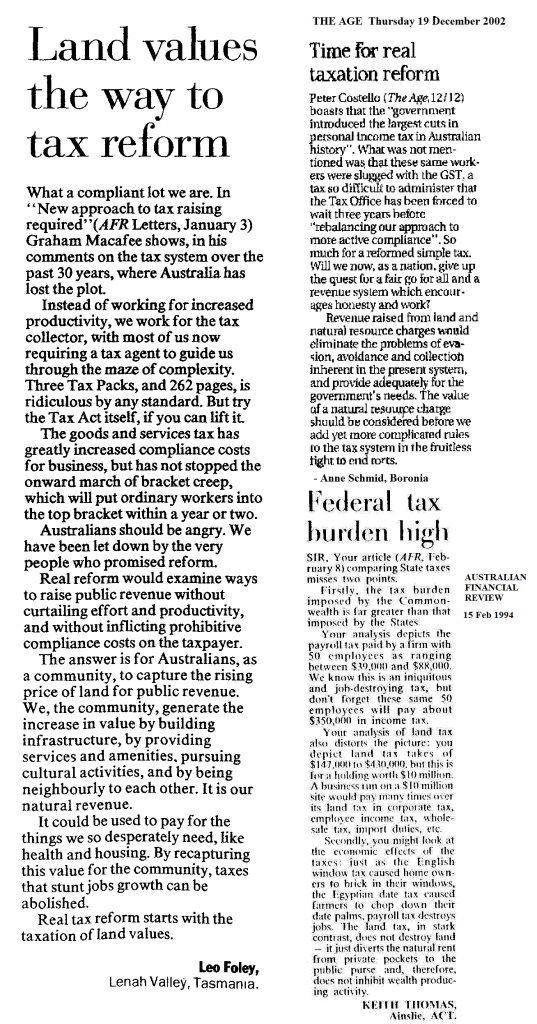 Wandering through Hardware Lane in Melbourne some two years after completing my real estate valuation qualification in 1973 at the Royal Melbourne Institute of Technology (RMIT), I noticed a commentary about the Victorian Land Tax in the window of a quaint little shop. “What would this outfit know about land taxes?” I thought. I went into the little bookshop and took away a handful of pamphlets. They obviously caught my imagination because almost immediately I revisited the shop, the office of The Henry George League, to purchase a copy of Henry George’s Progress and Poverty.
Wandering through Hardware Lane in Melbourne some two years after completing my real estate valuation qualification in 1973 at the Royal Melbourne Institute of Technology (RMIT), I noticed a commentary about the Victorian Land Tax in the window of a quaint little shop. “What would this outfit know about land taxes?” I thought. I went into the little bookshop and took away a handful of pamphlets. They obviously caught my imagination because almost immediately I revisited the shop, the office of The Henry George League, to purchase a copy of Henry George’s Progress and Poverty.
I couldn’t put the book down. I started reading it through what remained of my lunchtime, on the way back home that evening on the train to Glen Waverley, and through most of the night. I finished reading it in my next lunchtime, the day after I’d bought it. I was thunderstruck at the ease of George’s logic and language. Moreover, I had heard nothing of these ideas during my valuation course at RMIT, although valuers concerned with property rating certainly needed to understand its contents.
Before reading Henry George, I had not even begun to contemplate that land price, too, was simply the private capitalisation of a site’s publicly-created net land rent—just as I had been taught in my property valuation course was the way to assess the value of improved commercial and industrial properties. I couldn’t comprehend why what constituted land price hadn’t been touched upon or explained in my valuation course.
Maybe Henry George was considered to be some sort of a threat to the status quo?
Similarly, most real estate valuers I spoke to had never heard of Henry George. Those few older valuers who had heard of him, mainly local government valuers, tended to speak of him dismissively. When asked to elaborate, it became clear that their understanding of was quite superficial, and that they’d been poorly advised about what George actually said. I found no valuer who had read him thoroughly until, about eight years later when working in the Australian Taxation Office as a real estate valuer, I was to meet Noel Wigmore, a valuer, a strong supporter of the ideas of Henry George, and the former head of the property division of the Victorian Railways. I had earlier worked in the claims department of the Railways in the same building, and for a few years contemporaneously, with Noel.
Not inspired by what I had perceived to be a lack of activity in the little shop in Hardware Lane, I didn’t join the Henry George League, but I did take the opportunity over the next few years to voraciously read all of Henry George’s works, and all the books by Georgist authors I could get my hands on.
Then, in January 1983, the flawed logic of an article Merits of Rating Systems in my professional magazine, The Valuer, raised my hackles. I rang the little shop in Hardware Lane. I believe it was the Geoff Forster, editor of the CSIRO magazine and intrepid editor of PROGRESS, the Henry George League’s journal, who answered my telephone call. No, he was unaware of the article, but he could give me the home telephone number of a man who may have seen it. That man was Allan Hutchinson, 1943 founder and still (in 1983) honorary director of the Land Values Research Group [LVRG]. Hutchinson advised me, yes, he had read the item in The Valuer and had intended to reply to it, but why didn’t I do so, instead? So I did.

It was not a particularly good letter, but I had been stirred into action by the faulty logic I had discovered was typically directed against the arguments of Henry George. At Allan Hutchinson’s invitation, I chose to join the Henry George League shortly after the publication of my letter in The Valuer in April 1983. If you can’t lick ’em, join ’em, I thought.
Subsequently, I had many enjoyable evenings with Allan and Mary Hutchinson eliciting supplementary Georgist history from them. I joined Allan’s Land Values Research Group (LVRG – the research body for the Henry George League) and the General Council for Rating Reform (GCRR) attending “working nights” in the company of a few others, analysing statistical data on building permits against each (then) rating regime, site value (SV) or net annual value (NAV). Without exception, SV always performed better, yet the Capital Improved Value (CIV) system–on which the whole of Victoria now operates–is closely related to the flawed NAV system. [!]
Following the death of the esteemed Allan Hutchinson on Sunday 24 April 1988, I assumed the honorary directorship of the LVRG. To later work for three years with the late Tony O’Brien in assessing Australia’ land rent was a rare privilege. My own particular specialty was to collect and collate data on real estate sales turnover from the Australian States and territories from 1987 back to 1972, because at that time neither the Australian Bureau of Statistics, the Reserve Bank of Australia nor federal Treasury bothered to do so. When aggregated against GDP, the graphical compilation I had nominated as the Barometer of the Economy appeared to accord strongly with Henry George’s theory.
Dr Gavin Putland subsequently became director of the LVRG in 2008 and, with his vast acumen, has rapidly progressed its work, in both a paid and (now) unpaid capacity. The Henry George League has since become Prosper Australia and that body has been kicking goals in educating the public to the virtues of publicly capturing economic rents rather than allowing them to be privatised.
Most world economies have teetered and fallen over the brink because revenue regimes have been fining productivity whilst they encourage rent-seeking. Therefore, it seems we have two options, namely, to continue taxing people and businesses for being productive, thereby keeping humanity in unwitting serfdom to the rentier class, or, to pay natural resource rents, instead of arbitrary taxes, into the public coffers, if we are to apply the brakes on monopoly, speculation, and repetitive financial devastation.
To me, the case to free people, the planet and economies is unassailable, and exciting challenges lie ahead for making the necessary switch to natural resource-based revenues.




 Wandering through Hardware Lane in Melbourne some two years after completing my real estate valuation qualification in 1973 at the Royal Melbourne Institute of Technology (RMIT), I noticed a commentary about the Victorian Land Tax in the window of a quaint little shop. “What would this outfit know about land taxes?” I thought. I went into the little bookshop and took away a handful of pamphlets. They obviously caught my imagination because almost immediately I revisited the shop, the office of The Henry George League, to purchase a copy of Henry George’s Progress and Poverty.
Wandering through Hardware Lane in Melbourne some two years after completing my real estate valuation qualification in 1973 at the Royal Melbourne Institute of Technology (RMIT), I noticed a commentary about the Victorian Land Tax in the window of a quaint little shop. “What would this outfit know about land taxes?” I thought. I went into the little bookshop and took away a handful of pamphlets. They obviously caught my imagination because almost immediately I revisited the shop, the office of The Henry George League, to purchase a copy of Henry George’s Progress and Poverty.

